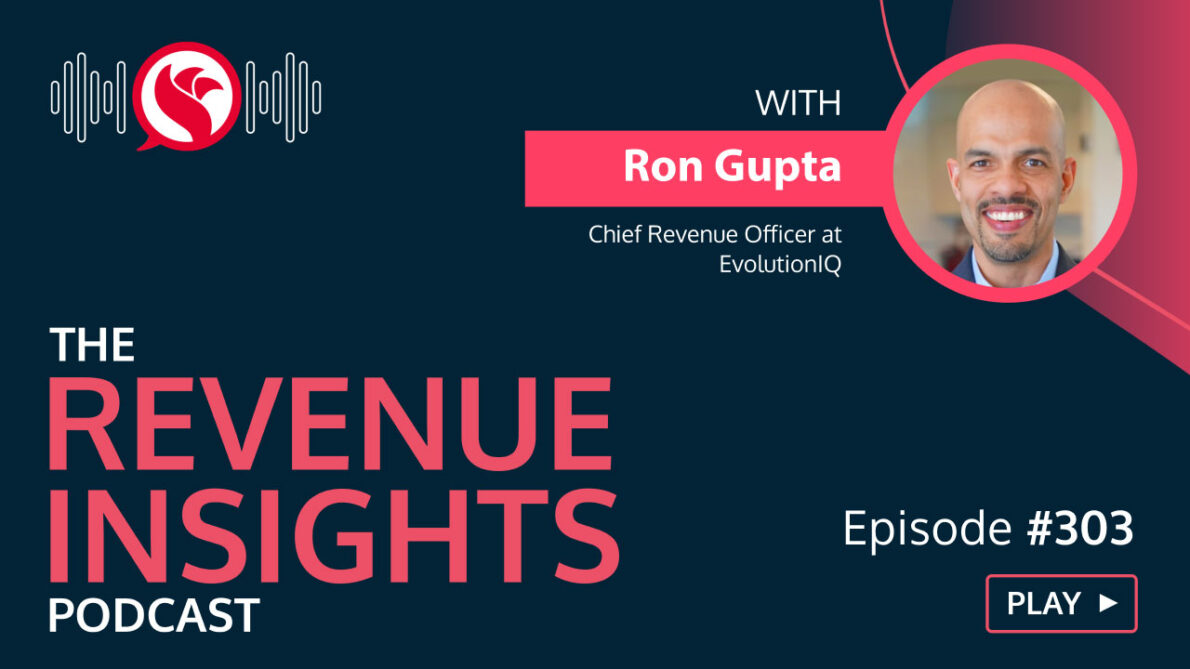Table of Contents
Share this article
Learn from the brightest minds how to predictably and efficiently grow revenue.
Related Content
Why Value Alignment is the New Growth Engine, with Dan Sylvester, SVP of Revenue at SundaySky
In this episode of Revenue Insights, host Adam Roberts, Sales Director at Ebsta, sits down with Dan Sylvester, SVP of Revenue at SundaySky to explore the evolution of B2B sales and customer success. Dan shares insights on the growing importance of personalized video content, maintaining brand consistency while democratizing content creation, and redefining customer success…
The Evolution of Revenue Enablement: From Training Function to Strategic Revenue Driver
How Modern Revenue Enablement is Transforming B2B Sales Success In today’s rapidly evolving B2B landscape, where over 50% of new revenue comes from existing accounts, the role of revenue enablement has never been more critical. But what exactly does modern revenue enablement look like, and how is it driving organizational success? In this deep dive,…
Why Sales Training Fails – And How AI is Fixing It with Ivy Holt, Head of Global Revenue Enablement at PagerDuty
In this episode of Revenue Insights, host Guy Rubin sits down with Ivy Holt, Head of Global Revenue Enablement at PagerDuty, to explore the evolving role of enablement in driving sales success. Ivy shares insights on the distinction between revenue operations and enablement, the challenges of measuring effectiveness, and the impact of AI and remote…

Data-Driven Strategies for B2B Sales Success with Ron Gupta, Chief Revenue Officer at EvolutionIQ
This week on the Revenue Insights Podcast, Guy Rubin, founder and CEO of Ebsta, speaks with Ron Gupta, Chief Revenue Officer at EvolutionIQ.
In this episode, Guy and Ron explore the intricacies of revenue generation, customer retention, and the evolving role of technology in sales. They discuss how Ron shaped effective go-to-market strategies, and now leverages AI to transform the insurance sector.
Rob Gupta is the Chief Revenue Officer at EvolutionIQ, who created the world’s first fully AI-driven claims guidance platform for the most sophisticated insurance carriers in the world. He is also an LP and part of the Investment Committee at Triphammer Ventures, an Alumni Ventures’ venture capital fund for alumni of Cornell that invests in companies with a Cornell connection. Before this, Ron was the Chief Revenue Officer at Ushur, and Vice President of Sales at Conga.
- Ron Gupta on LinkedIn
- EvolutionIQ website
- Guy Rubin on LinkedIn
- Ebsta Revenue Insights Newsletter
Time Stamps:
- 00:00 – Introduction
- 01:16 – Career Path and Background
- 04:42 – Transition to Chief Revenue Officer Role
- 06:44 – Customer Experience Automation Product
- 08:02 – AI Integration in Business
- 15:48 – Preparing for Growth
- 18:07 – Upgrading the Tech Stack
- 21:27 – Sales Cycle Complexity
- 23:43 – Team Structure and Revenue Operations
- 32:00 – Training Through Collaboration
- 34:00 – The Pitfall of Jumping Stages
- 37:07 – Intellectual Honesty in Forecasting
Highlights:
Embracing the Complexity of Revenue Challenges
Ron explains that the average sales cycle for their services typically ranges from six to nine months, although some can be longer or shorter. The process often begins at a high organizational level and eventually transitions to individuals involved in delivery. Throughout this complex process, an ROI is developed as part of the proposal, which reinforces the service’s value. Ron emphasizes the importance of instilling confidence in clients by providing ample proof points before they fully engage with their company. This thorough approach has resulted in a strong retention record, with no churn among production customers in over five years of operation.
Planning for Growth and Team Alignment
Ron highlights the critical need for organizations to prepare for the next phase of growth. As the first Chief Revenue Officer at EvolutionIQ, he highlights the importance of not just maintaining existing operations but strategically planning for expansion into new geographies and product launches. Ron stresses that achieving this requires enhanced coordination, processes, and tooling rather than simply relying on a sales team to drive growth. He cites the significance of having the right talent in place, referencing Jim Collins’ principle that “who’s on the bus is almost more important than where the bus is going.” By assembling a strong team and developing structured processes, organizations can effectively orchestrate their growth and navigate the complexities of scaling.
Empowering Sales Reps Through Intellectual Honesty
Ron emphasizes the importance of intellectual honesty within sales organizations, asserting that sales leaders must create an environment where reps feel safe to report bad news. He argues that sales reps often hesitate to disclose challenges due to pressure from leadership. This leads to wasted resources on deals with low closing potential. Instead, leaders should encourage transparency, allowing teams to focus on viable opportunities. By recognizing when a deal is unlikely to close and encouraging reps to let go of such deals, organizations can optimize their resources and increase overall efficiency. This practice not only helps in maintaining accurate forecasts but also preserves the value of human resources, which is often the largest budgetary expense.
Subscribe to the Revenue Insights Podcast:
Recommended Episodes:
- You Can’t Sell to Someone Who Can’t Buy with Michael Dalley, CRO at Aerial Vantage
- From Inbound to Outbound: The Sago Sales Transformation with CRO Katharine Reagan
- Optimizing Sales Operations Success with Akira Mamizuka of LinkedIn
- Active Listening, Intent Data, and Events as Pipeline Game Changers with Leslie Venetz of The Sales-Led GTM Agency